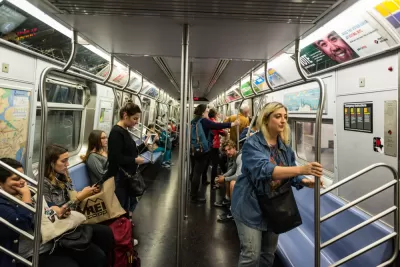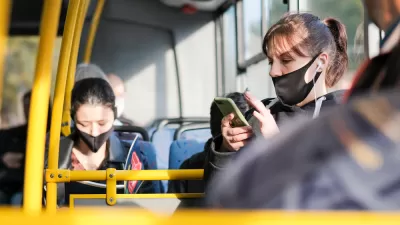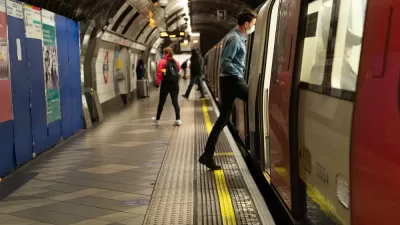As the coronavirus continues to move across the globe, its effects on shared transportation modes and freight shipping are becoming more apparent.

The coronavirus is affecting global transportation networks, with public transportation and air travel hit especially hard. The impacts in Chinese cities portend what could be coming to other parts of the world as the virus continues to spread.
"In Shanghai and Beijing, which are not subject to quarantine, ridership on their metro systems are down 85 percent and 91 percent, respectively (Check out the full data table here.) Intercity rail trips have dropped more than 80 percent. Domestic airlines cut 13,000 daily flights within the country and some desperate ones are offering $4 fares," writes Paul Lewis.
Research suggests that public transit is not where people are infected, and the work and social sites that people use transit to reach are the concern. Still, transit agencies are preparing systems, says Lewis. "[They] are investing millions of dollars for masks, signage, and disinfectant supplies to enable continue operations during a potential outbreak. Private companies are also implementing policies to ensure the safety of their employees and customers."
The coronavirus pandemic is also highlighting the interconnectedness of the global supply chain as freight shipping delays affect manufacturing around the world. "Such disruptions will have short term effects on the ability to sell products, but in the long run could force companies to rethink supply chains exposed to epidemic risks," adds Lewis.
FULL STORY: The Effects of Coronavirus on Transportation

Maui's Vacation Rental Debate Turns Ugly
Verbal attacks, misinformation campaigns and fistfights plague a high-stakes debate to convert thousands of vacation rentals into long-term housing.

Planetizen Federal Action Tracker
A weekly monitor of how Trump’s orders and actions are impacting planners and planning in America.

San Francisco Suspends Traffic Calming Amidst Record Deaths
Citing “a challenging fiscal landscape,” the city will cease the program on the heels of 42 traffic deaths, including 24 pedestrians.

Defunct Pittsburgh Power Plant to Become Residential Tower
A decommissioned steam heat plant will be redeveloped into almost 100 affordable housing units.

Trump Prompts Restructuring of Transportation Research Board in “Unprecedented Overreach”
The TRB has eliminated more than half of its committees including those focused on climate, equity, and cities.

Amtrak Rolls Out New Orleans to Alabama “Mardi Gras” Train
The new service will operate morning and evening departures between Mobile and New Orleans.
Urban Design for Planners 1: Software Tools
This six-course series explores essential urban design concepts using open source software and equips planners with the tools they need to participate fully in the urban design process.
Planning for Universal Design
Learn the tools for implementing Universal Design in planning regulations.
Heyer Gruel & Associates PA
JM Goldson LLC
Custer County Colorado
City of Camden Redevelopment Agency
City of Astoria
Transportation Research & Education Center (TREC) at Portland State University
Jefferson Parish Government
Camden Redevelopment Agency
City of Claremont




























